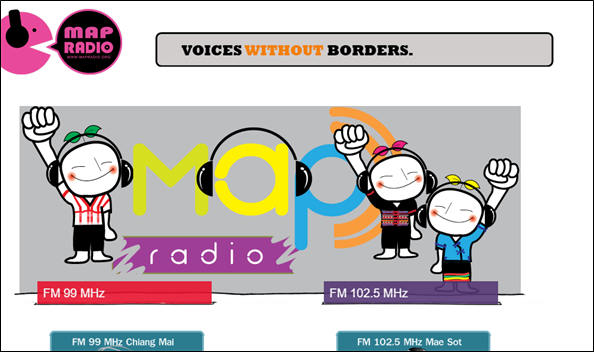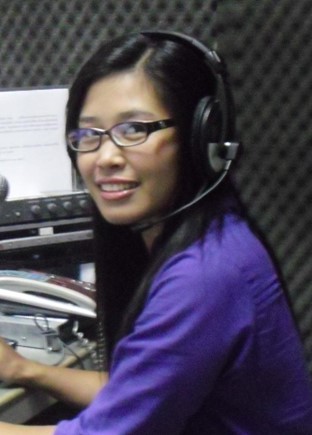RJ-ing to Collectivise
During the Voice and Participation meeting in Chiang Mai in February 2023, the room was delighted when Pim introduced herself as the community organiser at MAP Foundation and radio jockey at the MAP radio station. Her role as Radio jockey (RJ) at the MAP radio station is linked to her social and cultural roots in the Shan community as well as her work as a community organiser of domestic workers in Thailand. In subsequent conversations with her, we learnt that she migrated to Chiang Mai, Thailand from Shan State in Burma for a better life and to work. She has worked in many roles - domestic worker, waitress, nanny, and now as a community organiser in MAP Foundation. There are other former migrants who are also now presenters and DJs at the MAP radio station in both Chiang Mai and Mae Sot.[1]
At MAP Foundation, Pim is part of the Labour Rights for All Program, which provides information about labour rights and the frequently changing immigration policy, while promoting occupational health and safety, and providing legal assistance. Her role involves organising migrant domestic workers in Chiang Mai. As a migrant herself, Pim’s inclination to assist them stems from her own experiences as a migrant.
As an aging society, Thailand’s demand for domestic workers and carers is on the rise. A large proportion of this demand is met by migrant workers from Myanmar who are driven out of their country due to political conflict and economic collapse. Despite the rise in demand for domestic workers, they remain outside the purview of social protection. The double whammy these workers experience is the unequal provision of labour rights for domestic workers, in addition to their tenuous status as migrants. As domestic workers, they have no mandatory access to social security because they cannot be registered by employers. So, the only option they have is a voluntary scheme, i.e. self-enrolment, that offers limited coverage. However, even this is only for Thai nationals and not for migrants. MAP Foundation, along with other networks, like HomeNet Thailand and Migrant Working Group, is advocating for Thailand to introduce the international norms for decent work for domestic workers under ILO Convention 189.
 Outside of national and international legal norms and frameworks, migrant domestic workers have much to learn and discuss to go on with their everyday lives as migrants and workers. They need to know about immigration policies and regularisation processes; their rights as domestic workers, their responsibilities, and how to resolve conflicts at the workplace without being exploited. This makes in-person meetings imperative to create a sense of collective and shared experience and reduce the workers’ feelings of isolation. Domestic workers experience exploitation, abuse, and disrespect in very insidious ways because of the private nature of their workplace. Without any wage standards, workplace conduct, or clear channels of remedy, women often rely on advice from their peers to resolve situations, or they simply change their employer, as sometimes they feel it’s the only way to resolve a bad situation.
Outside of national and international legal norms and frameworks, migrant domestic workers have much to learn and discuss to go on with their everyday lives as migrants and workers. They need to know about immigration policies and regularisation processes; their rights as domestic workers, their responsibilities, and how to resolve conflicts at the workplace without being exploited. This makes in-person meetings imperative to create a sense of collective and shared experience and reduce the workers’ feelings of isolation. Domestic workers experience exploitation, abuse, and disrespect in very insidious ways because of the private nature of their workplace. Without any wage standards, workplace conduct, or clear channels of remedy, women often rely on advice from their peers to resolve situations, or they simply change their employer, as sometimes they feel it’s the only way to resolve a bad situation.
In-person meetings happen at a localised level where workers in the area meet to discuss their work, leisure, and life. Pim explains that this trust-building is difficult because of the little free time women have as domestic workers, especially those who are live-ins. These localised meetings inform the formal monthly meetings and their activities. The group now has a LINE group chat, which is a social networking platform with a closed membership where people can request advice and help each other. The formal meetings are more structured depending on the need to engage more on legal issues, learn about international standards, or in order to meet with other organisations or networks to discuss their advocacy plan.
MAP Radio, on the other hand, has a wider reach in Chiang Mai and Mae Sot areas since 2007 and 2010 respectively. MAP Radio covers a radius of nearly 24 kilometres through its FM frequency. However, its reach is wider and more diverse because it is also streamed online (on Facebook, and a website). The broadcasting is done in Shan and Burmese languages, nearly all day long. The radio shares news relevant to the region as well as information for the workers. MAP Radio has a wide reach amongst the Shan community as well as migrant women listeners.

Pim is one of MAP’s numerous RJs and presenters. She presents topics relevant to domestic workers as well as information on labour rights and social protections and gives updates on migration policies. The programme also includes Shan songs, music, and updates on festivals, as well as calls from listeners with questions or messages. Many listeners feel that she is a familiar voice, so they contact her for advice and this can lead to that person joining the domestic worker’s group. The listeners’ survey conducted in 2016 showed that listening to MAP Radio was very important for information on integration along with entertainment. In addition, 2 out of every 3 listeners reported that after receiving information from the radio they took (unspecified) action in the following areas: trade union/organising, applying for a driver’s license, women’s rights, sexual reproductive health and rights (SHRH), minimum wage/labour rights, HIV/AIDS, participating in religious events, and youth empowerment.
MAP Radio gives Pim the platform to connect with the larger migrant community. She believes this is a good way to establish a continued presence amongst the Shan and Burmese migrant communities and support in-person meetings, and efforts in organising domestic workers.
Written by Srishty Anand (GAATW-IS) and Brahm Press (MAP Foundation) with editorial inputs from Borislav Gerasimov
[1] These are cities in North Thailand, close to the Myanmar border.

